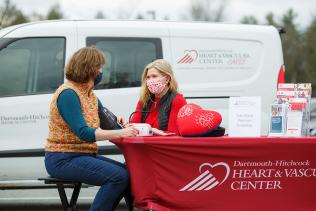The Center for Rural Health Care Delivery Science is strategically structured with an Administrative and Mentoring Core and two research cores:
- Our researchers and mentors—and our Center itself—are supported by the Administrative and Mentoring (A&M) Core, which serves as the main communications and resource hub.
- Our programs require specialized data gathering and analysis, which are expertly reinforced by the Center’s Statistics, Informatics, and Qualitative Methods (SIQM) Core.
- Community connections are essential to our mission. The Community Engagement and Outreach (CEO) Core supports our researchers by engaging rural stakeholders.
These cores provide the foundation for the success of each research program by ensuring they are supported, have necessary resources, meet Center standards and achieve program milestones.
Administrative and Mentoring (A&M) Core
The A&M Core delivers the critical and practical support our Center requires for success by ensuring we are reaching milestones and achieving our goals. It manages institutional resources, pilot project funding and new faculty recruitment.
This team provides the leadership and general administrative foundation our researchers, mentors, research cores and advisory committees rely on to move their important work forward. This includes project management, timely communications, financial management and attention to evaluation and oversight processes. It also oversees the mentoring and evaluation plans of each research program and assists Research Project Leaders with regulatory compliance and reporting.
This Core serves as the central hub—ensuring our Center is actively part of a developing, integrated and multidisciplinary scientific community, across Dartmouth Hitchcock Medical Center and between collaborators and community partners. It leads forums and uses digital platforms to advance the exchange of ideas. This includes weekly Research-In-Progress meetings, seminars, an annual symposium and our online Community Health Hub.
Statistics, Informatics, and Qualitative Methods (SIQM) Core
Specialized data gathering and analysis are essential to the success of our research programs. The SIQM Core supports the sourcing of existing analytic expertise and data resources. It also coordinates Center research by identifying and applying state-of-the-art statistical, geoinformatics, data science and qualitative methods that best advance each research program’s outcomes.
By employing this comprehensive approach using various data sources, methods and measures, our researchers can more accurately evaluate rural healthcare delivery—and understand the barriers faced by rural residents when seeking healthcare services.
The SIQM Core provides:
- Quantitative methods and biostatistics: custom consultation for Research Project Leaders, including development of innovative statistical methods
- Qualitative and mixed-methods: mixed-methods services and infrastructure that support rural healthcare research
- Data infrastructure and interoperability: access to an innovative data infrastructure to support the use of diverse data sources, including claims, administrative, clinical and geospatial data
Community Engagement and Outreach (CEO) Core
Community connections drive our work. The CEO Core supports our researchers by engaging stakeholders in rural areas through existing relationships and new partnership development to promote and sustain collaborative research opportunities.
It provides consultation with essential stakeholders—community members, people who need medical care, caregivers, community health providers, advocates and policymakers—and a data-rich environment for researchers working toward improving rural health services and outcomes. This is achieved by:
- Devising questions that are meaningful and generalizable across stakeholder groups
- Sharing findings directly with stakeholders
- Developing feasible, effective and scalable strategies to address these problems
- Promoting the use and dissemination of their findings in “real world” settings
This Core works with community advisory boards, the tristate Practice-Based Primary Care Research Network, networks of community-based agencies and organizations, and local, regional and national partners in IDeA states (states with low NIH funding for biomedical and behavioral research—Maine, New Hampshire and Vermont are IDeA states).
The CEO Core supports researchers, project leaders, and community experts with consultations on:
- Integrating community engagement into their research
- Planning and conducting community engagement studios
- Connecting with community experts and resources
For more information, please reach out to our Community Engagement Navigator, Sharon Feeney, at cehub@hitchcock.org.
Community partnerships
- Center for Advancing Rural Health Equity (CARHE) brings together researchers, educators, learners, clinicians and communities so everyone has a chance to thrive and be healthy.
- Northern New England Clinical and Translational Research (NNE-CTR) Network is a network of researchers, clinicians and community partners across Maine, New Hampshire and Vermont dedicated to achieving health equity through innovative, regionally-relevant research.
- Northern New England CO-OP Practice & Community Based Research Network (PBRN) includes 400+ clinicians in more than 75 practices across Northern New England for dissemination of research findings.
Community Engagement Advisory Board members
- Elizabeth Carpenter-Song, PhD, Research Associate Professor, Department of Anthropology, Dartmouth College
- Casey Doerner, BSN, RN, Health Systems Educator and Wellness Nurse Lead for Vermont Support and Services at Home (SASH)
- Alia V. Hayes, MPH, Oral Health Program Manager, Bureau of Prevention and Wellness, New Hampshire Division of Public Health, Department of Health and Human Services
- Sarah Jackson, Executive Director, Vital Communities
- M. Kay Jankowski, PhD, Associate Professor of Psychiatry, Dartmouth Health
- Neil Korsen, MD, MSc, Scientific Research Director of the Dartmouth/Northern New England CO-OP Practice and Community Based Research Network (Dartmouth CO-OP)
- Eileen Groll Liponis, Executive Director, The New Hampshire Foodbank
- Meagan Stabler, PhD, CHES, Executive Director of the Dartmouth/Northern New England CO-OP Practice and Community Based Research Network (Dartmouth CO-OP)
- Maria Varanka, MS, NRAEMT, Program Manager - EMSC, Emergency Services-Research, Dartmouth Health

